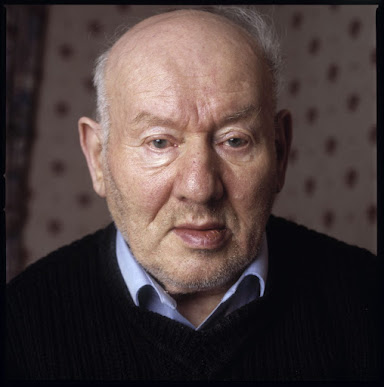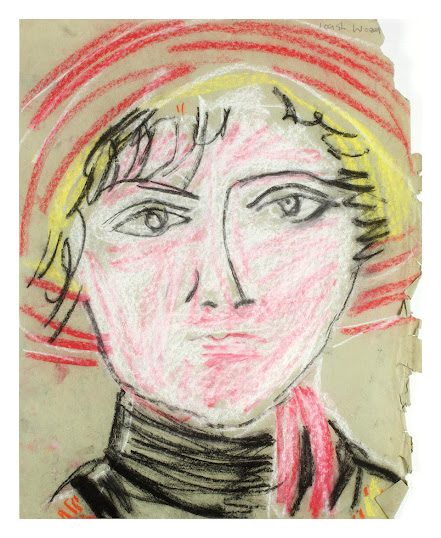He lived reclusively in his parents' home in the Chapel Allerton area of north Leeds. Before and just after World War II he received good formal training at Leeds College of Art and at The Royal College of Art in London. He knew what art was and what it might be.
Some time thereafter he appears to have suffered a nervous breakdown and spent the next five decades painting furiously and passionately but without the sustenance that other artists might provide. He didn't even have a telephone.
His brother Saul tried to visit him every week but never got to see any of the pictures that Joash had created. It seems that Joash Woodrow made art because he was driven to do so. It was the art that mattered, not what others might think about it.
After Joash went into care, Saul delivered a huge collection of art books from the old family home to a local secondhand bookstore and that's where several were spotted by another Leeds artist called Christopher Wood. They included many overpaintings and drawings by Joash Woodrow. Wood alerted a gallery owner from nearby Harrogate who effectively saved the collection from destruction.
Exhibitions of Joash Woodrow's work happened before his death and some paintings were sold but he never knew about this as his last three years were spent in a kind of mental incarceration and perhaps Saul remembered that his brother had never actively sought acclaim.
Untitled and undated but just for a small taste of him, here are four examples of Joash Woodrow's art as discovered in his house in Leeds:-








Wonderful to make art just for oneself. I like the first and last ones very much. To me, they both speak of the orderliness of his life and surroundings. Or maybe it just reflects the rigidness of his being. Who knows? The preparatory sketch seems to have been done in crayon. I wonder what brought him entering your mind today?
ReplyDeleteWhat brought him to my mind? By accident I had been reading about him. That's all. I am glad that you instantly saw some merit in his work Lady Thyme.
DeleteSo Joash never approached a dealer but painted out of compulsion?
ReplyDeleteThese four paintings are impressive: they possess that subjective spirit which Victor Pasmore thought more important than technical accomplishment.
Joash must have asked the question every creative person asks:
Am I any good? Am I an imposter? Am I an egotist to keep going?
His isolated home in Chapel Allerton; his brother Saul who never saw the paintings on his weekly visits; the painter's last years lived out in a kind of mental twilight: this is now the grim legend of Joash Woodrow which the media will turn into a saleable story.
Do you remember Gulley Jimson in *The Horse's Mouth* by Joyce Cary?
Gulley paints on a barge in the Thames and after a night in the pub, lights three matches to see if his half-finished canvas is any good.
First match: Quite good.
Second match: Blood awful.
Third match: Need to work on it tomorrow.
In cinemas now, "A Tortured Soul" starring John Haggerty as Josh Woodrow and Tasker Dunham as the cat. "Ee-by-gum, a right good fillum" - The Yorkshire Post.
DeleteI am grateful that you brought Joash to my notice: I would have purchased any one or all four of those paintings that you feature.
DeleteWhen I read your blog late last night I thought it sounded like a lost novel by James Hanley (1897-1985) born in Liverpool of Irish descent.
See Wikipedia.
*Boy* one of Hanley's bleakest novels was reissued in deluxe paperback with an Introduction by Anthony Burgess who said Hanley should have got the Nobel Prize for Literature.
For 40 years I have meant to order Hanley's novel *Dream Journey* (1976) which seems to be an autobiographical work:
A writer's writer who enjoys critical but never public success, and his efforts to keep writing and hold his marriage together.
He sounds like Joash Woodrow and Gulley Jimson.
From viewing online I see one or two second-hand dealers in England have copies of *Dream Journey*.
I can see Hanley's protagonist in the haunted face of Joash Woodrow.
Now I think I will get the train to Manchester and visit Chapel Allerton.
I can see the Lowry Centre at the same time.
Even stranger.
Delete*A Dream Journey* is about Clement Stevens a 55-year-old painter and his wife Lena.
It is set in a rooming house during WWII, reminiscent of Patrick Hamilton's novels.
Get the miniseries DVD of Hamilton's novel: *Twenty Thousand Streets Under the Sky* 2005.
Poor man, sounds like he was a tortured soul.
ReplyDeleteHe was rather like a hermit and never had a meaningful loving relationship with any woman or man.
DeleteHe must have had an adequate income to not work, unless he received social security. He is of many whose talent is not known until after their death.
ReplyDeleteMaybe he lived off his parents' legacy and of course he had no rent to pay. His brother Saul kept a watching eye over him.
DeleteI hope he got some relief and comfort from his art.
ReplyDeleteIt is impossible to put oneself in his shoes.
DeleteI love the impressionistic look to his art!
ReplyDeleteThere are echoes of other artists there. It is said that he had over 3,000 books about art.
DeleteInteresting biography. One can only imagine the torment he went through.
ReplyDeleteYes. A kind of madness being so driven.
DeleteHe created art but how did he live? Did he ever leave the house, for instance to find inspiration for paintings such as the last one, or was that maybe the view from his back room? It is an intriguing and sad story, and of course I wonder who the lady was whose face he sketched and painted.
ReplyDeleteLike Haggerty says, there is material there for a book and/or film, but it was a real person's life first and foremost.
Yes. In the sixties and seventies he did leave the house with his sketch pads, gathering imagery and ideas from Leeds and its environs.
DeleteThey don't appeal to me at all. But then so much art doesn't appeal.
ReplyDeleteI think many others would feel the same way as you River.
DeleteThere is something compelling about the first and last pictures that make me want to pause and stare at them.
ReplyDeleteI would love to have those on my wall.
His art was very cheap at first but now those paintings would cost you around £18,000 each.
DeleteCriminy!
DeleteNot an artist I have heard of, but his work seems that of a tortured soul, and has a certain naivety. I can imagine him painting furiously, as he must have, to achieve such an output.
ReplyDeleteSeems like one of many artists who unknown and unappreciated while alive.
ReplyDeleteHow interesting. I've never heard about this story. I can't imagine creating art in such isolation for so long, driven by just an inner fire.
ReplyDeleteHis landscapes do not do much for me the woman on the bicycle. Her eyes...
ReplyDeleteOne wonders what went on his mind. Like Ellen D., I hope that his art brought him some peace.
I like the idea of just getting on doing whatever it is one likes to do and not caring about what anyone else might think.
ReplyDeleteI love the fact that to him creativity wasn't a commercial outlet, but something he pursued for its own ends. I wonder if painting was a therapeutic way of getting his anxieties, private thoughts and life challenges onto the canvas rather than allowing them to consume him - a sort of artist's version of Julia Cameron's 'Morning Pages', and therefore not intended to be seen by others. The paintings don't particularly appeal to me, but they have a clear 'voice running through them, and it pleases me that they all use 'happy', bright colours, which speaks of a resolved contentment in his reserved way of life, rather than dark melancholia.
ReplyDeleteVery interesting - thanks for sharing this. This is not art I would buy but it is interesting to look at and know the story behind it. Poor man.
ReplyDeleteI also love the first painting. The preparatory sketch draws me in but the bicycle just seems odd.
ReplyDeleteI'm sure I am revealing more about myself than the artist!
You've featured two artists this week. If I had to pick which one was happier, it would be Joash
A very good artist. Interesting that he never sought acclaim.
ReplyDeleteHe could be called Leeds Lowry. Everyone's got some talent.
ReplyDeleteHow many artists have been tormented souls who painted to relieve their frustrations? A rhetorical question by the way.
ReplyDeleteHe seems to have been quite talented though his primitive style would not appeal to everyone.
ReplyDelete